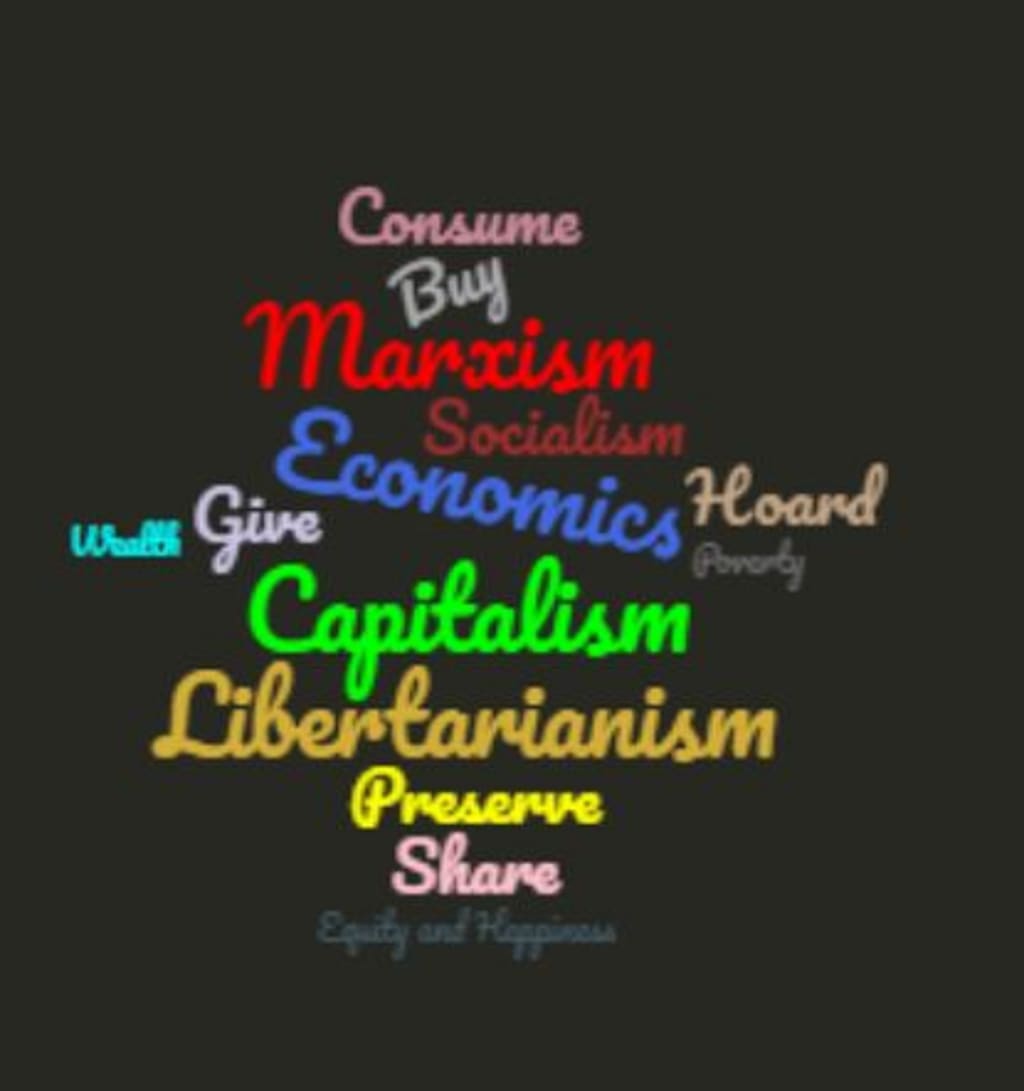Income Inequality and the Future
What we might do

So, a questioner on quora asked the following: “Do you think that Joe Biden during his term in office needs to implement programs targeting income inequality in the United States? If yes, what types of general programs would you recommend?”
To properly answer this question, the first thing is to define what we mean by undergirding things like “the Economy” and “Capitalism” and then move on to the meaning of “Income Inequality.” From there we will look at what has historically caused income inequality in Capitalist systems, what new pressures exist in the political economy now, what effects those are having on income and on Capitalism itself, and finally what we might do.
The Economy (and the Political Economy)
The simple and commonly accepted definition of the economy is: “the wealth and resources of a country or region, especially in terms of the production and consumption of goods and services.” That’s it, that is the economy. The phrase political economy however is a bit more complex, it includes production, trade, and their relationship with the law and the government. So, while the economy of a country is its production and consumption of goods and services, the political economy of that same region includes trade, the law, and the government.
Capitalism
In its simplest form, it is an economic and political system in which a country's trade and industry are controlled by private owners for profit, rather than by the state. All sorts of qualifiers relate, however. Is it regulated? Is it laissez-faire? Is it corporate? Etc. America, as an example, claims often to be laissez-faire Capitalism - but it isn’t - if it were then corporate bailouts would not exist, for example. They do, so do tremendous incentives and the type of social safety net for corporate entities that do not exist to any degree for individuals - so saying that America has any form of laissez-faire Capitalism is false. We are going to be using the base value of Capitalism therefore because we are clearly a Capitalist society, but we will not try to further define the style of Capitalism we use at this time, during this discussion.
Income Inequality
Since we are specifically talking about the United States, then income inequality is the significant disparity in the distribution of income between individuals, groups, regional populations, and social classes.
What historically caused income inequality?
So within a Capitalist system, a small number of people have Capital (defined as: “wealth in the form of money or other assets owned by a person or organization or available or contributed for a particular purpose such as starting a company or investing.”) those are, by definition, the “Capitalists” -- the majority of the people do NOT have that wealth and need enough to survive, and so exchange their labor for money (income). It is fair to say that the vast majority of those who read this exchange their labor for money. People who exchange their labor for money were called, by all the founding economists - workers.
When what the workers can make exchanging their labor for money is so grossly out of step with what they need to survive that they are “immiserated” (made miserable, homeless, hungry, etc.) then the income inequality is too great to be borne. Historically that has led to revolts, revolutions, and more benignly to the existence of the Labor movement.
Generally, the reason that income inequality rises to that point is that most Capitalists (not all) are primarily interested in increasing their share of the overall wealth. They hire workers at the lowest possible salary to fill the positions they need filled, they fight against unionization, and in some cases, they even cheat their workers or “steal” their earnings (wage-theft).
More recently many “working class” jobs were lost to other countries, primarily because American Capitalists could pay less for labor power in those countries.
HOWEVER, now there are new pressures, more potent than any before, and those pressures are already bringing about the end of mass labor.
Technology. Particularly robotics and Artificial Intelligence are in the process of rendering workers in general (except for some highly educated professionals) superfluous. This is an ongoing process by the way. It was understood to be inevitable among many in the elite Capitalist class as long ago as the early 70s.
Workers in America are suffering the “frog syndrome” - they are being boiled slowly, and most are not noticing until it is too late.
I don’t know to what degree the “boiling” is being coordinated, but I find it odd that the initial victims of technological replacement were primarily African American factory workers, and that as factory jobs that they had traditionally filled were replaced, mostly by robots, the introduction of Crack cocaine occurred in cities, in large part due to Iran-Contra. Now, rural White workers are being displaced through the same mechanism, and oddly again, Meth has increasingly been introduced to their areas. It is probably coincidence, but it seems awfully convenient to my mind.
Regardless, the Luddites did not win against the shearing frames and the neo-Luddites will not beat out the robots - so as a culture we need to look at other solutions.
To be very clear, what we see as income inequality now is not correcting itself. At the end of the Obama years we saw the lowest unemployment since the 50s and yet there was no upward pressure on wages. That trend continued, though slowing throughout the first 3 years of President Trump’s administration. STILL no upward pressure on wages. This is a strong indicator that the traditional structure of supply and demand has failed. It is no longer necessary to have high unemployment to keep wages low. Emergent technology is doing it. In fact, that is an argument that has been recently deployed against raising the minimum wage. If the cost of the workers is as high as the cost of replacing them with technology, the jobs will go away FASTER than they otherwise would. This is not a new idea and the basic concept is explained in this 2018 working paper https://www.nber.org/system/files/working_papers/w23667/w23667.pdf How old is it as an idea? Here is a good example of why I say the Capitalist elites have long been aware of the possibilities. This position paper is from 1965: https://review.chicagobooth.edu/economics/archive/dont-fear-automationfear-minimum-wage
So where does that leave us? In a position where we must come up with other solutions. Raising the minimum wage is a SHORT TERM solution and must not be the only solution. This particularly comes into focus when you realize that supply and demand is failing in other areas too. Have you noticed, we have pumped 4 trillion dollars into the economy in the last year, with no appreciable inflation? We are about to pump another 2 trillion in - it will have an equal effect - none. The only thing inflating is fuel prices, one of the few areas where there still is a direct relationship between supply and demand that has a real lag. Gasoline is not inflating due to “lots of money” it is inflating because production was slowed after demand plummeted last spring, that dropped prices until well heads could be shut down, etc. Now supply has been cut and demand is rising again. It is also worth noting that much of the industry is under the control of Koch industries, a company that would do anything to stop President Biden, considering the investments of their principals in his opponents. So if they can get people to blame him, they would be happy.
So, JIT manufacture, robotization, and artificial intelligence, together with new emerging technologies in energy, materials, batteries (who thought there would be oxygen based batteries?), and so forth change the balance between supply and demand and therefore not only change the conditions of employment but the conditions of production and consumption.
Income inequality is now a choice. It is a choice to maintain a model that is rapidly aging out entirely. Within 20 years we will GLOBALLY have no need for factory workers, truckers, stevedores, etc. The Capitalist elites KNOW that just as they knew in 1965 that they could pressure the minimum wage by threatening automation. Automation will come regardless but look, just work for pennies and we will DELAY it. There is not even a claim that they won’t do it.
So, what do we want for our children, our grandchildren, our world? Those are the questions to consider while coming up with a solution to apply going forward.
Solutions that do NOT apply as viable:
“Stopping” the automation - has never worked, never will - makes things worse in the long run by misstating the possible.
Letting “the market” take care of it - has never worked, never will - the “market” is controlled by the Capitalist elites, if a majority of them consider all the workers worthless dogs, they are NOT going to have the “market” correct the inequity. We already see evidence of that - there are a few billionaires who care (Gates, Hanauer, MAYBE Zuckerberg, I think he does, Soros, Buffett) but the majority do not.
Possible solutions that MIGHT be viable:
Artificially maintaining the present system -- So, the reason to pursue this would be that many people feel that their only “meaning” in life comes from their jobs. To pursue this would NOT stop automation, what it would do is create a lot of make-work jobs that would be made to appear needed and would deliver a living wage. This would have to be done as an either-or to most major Capitalist elites “You do this, OR we take everything you have and abandon you in the worst slum we know of.”
Creating a new paradigm Where something other than labor-power is exchanged for money. This is more ambitious and requires a LOT of leadership. It would start with a think tank and be implemented in waves. I do not pretend to know what the new paradigm would be, but I do know that this is a distinct possibility. Capitalism is roughly 500 years old in any recognizable form, it isn’t sacred, there is nothing holy or supernatural about it - it is an imposed system, it can be changed.
Creating a new system This is the hardest choice. While Capitalism itself is fairly new, the use of some sort of medium of exchange is much older - whether it was barter or seashells or beads - it's been around a while. It too is not sacred, but it is more intrinsic by far to the human psyche. We could go to the “Star Trek” system, but I don’t see it as likely for many years yet.
Personally
I personally think that in the short term, we raise the minimum wage and then we organize the details and move to either A or B. I personally prefer B, and as I said, I think it is doable though harder than A.
Opposition
Opposition will come primarily from entrenched Capitalist elites to ANY suggested change. They are opposed to raising the minimum wage, they will howl from the hilltops at the idea of making a more permanent change.
It is not that they do not understand the movement of capital, or that they do not think it will benefit them if there is greater availability of money to the workers. They know those things. It is because they do not want to lose power.
Money = Power
If you have a lot of money you can do what you want to “lesser people.” that is the sum total of the political positioning by most of the elite Capitalists. They refuse to look beyond that.
They will try to talk people out of it (as they are), they will bloviate and hire people to bloviate for them. They will do everything in their power to divide those who would benefit against themselves (they already are) and they will try to keep the people from taking any constructive action until it is too late.
Then? Who knows, maybe they will follow the gentle’s ideas that I was talking to, and tell everyone else to “just go away.” I don’t know.
Some Reading you could do if you wish, I am not recommending anything with heavy “jargon” - these should be attainable for non-specialists and can provide some perspective here and there.
https://www.politico.com/magazine/story/2014/06/the-pitchforks-are-coming-for-us-plutocrats-108014
Rifkin, J. (2014) The Zero Marginal Cost Society; New York; St. Martin’s Press
https://time.com/5876604/machines-jobs-coronavirus/
About the Creator
Reynolds Jones
I was always a reader. It was Dungeons and Dragons that also made me a writer. While my career has been primarily in the academe, where I have worked for nearly 30 years, my passion has always been in fantastical worlds and in gaming.






Comments
There are no comments for this story
Be the first to respond and start the conversation.